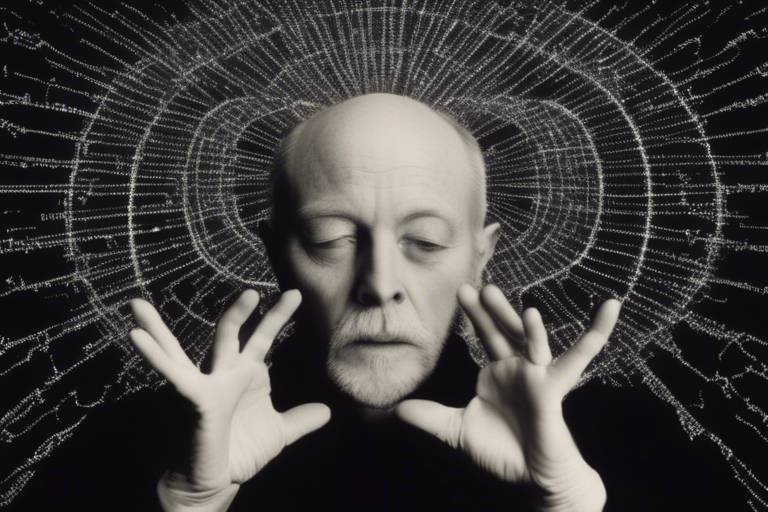Metaphysics and Its Implication in Modern Day Life
Welcome to the intriguing world of metaphysics, where we delve into the fundamental questions that govern our existence and reality. You might be wondering, "What does metaphysics have to do with my daily life?" Well, the truth is, metaphysics is not just an abstract concept confined to dusty old books. It permeates our thoughts, beliefs, and actions in profound ways. From the moment we ponder our existence to the choices we make every day, metaphysical inquiries shape our understanding of the universe and our place within it.
Imagine waking up each day and questioning the very nature of reality. What is real? What is merely a figment of our imagination? These questions have puzzled philosophers for centuries, and they continue to resonate in modern society. Metaphysics encourages us to explore beyond the surface, challenging us to think critically about the essence of being and the universe's workings. It's like peeling an onion—each layer reveals new insights, sometimes bringing tears of revelation as we confront uncomfortable truths about existence and our role in it.
In our fast-paced, technology-driven world, metaphysics may seem like an antiquated field of study. However, its implications are more relevant than ever. Consider how our understanding of reality influences everything from scientific advancements to ethical frameworks. For instance, when scientists explore the nature of the universe, they rely on metaphysical assumptions about causality, time, and space. These assumptions form the backbone of scientific inquiry, guiding researchers as they seek to unravel the mysteries of existence.
Moreover, metaphysics invites us to reflect on our personal beliefs and values. Have you ever considered how your views on free will versus determinism shape your decisions? Or how your understanding of morality influences your interactions with others? These are not just philosophical musings; they have real-world implications that affect our relationships, careers, and overall well-being. By engaging with metaphysical concepts, we can gain a deeper understanding of ourselves and the world around us, ultimately leading to more informed choices and a more fulfilling life.
So, as we embark on this journey through the realms of metaphysics, keep an open mind and a curious heart. The exploration of existence and reality is not just an intellectual exercise; it's a path to greater self-awareness and understanding. In the sections that follow, we will delve deeper into the foundations of metaphysics, its intersection with science, ethics, and its practical applications in our lives. Get ready to challenge your perceptions and expand your horizons—your adventure into the essence of being is just beginning!
- What is metaphysics? Metaphysics is a branch of philosophy that explores the fundamental nature of reality, existence, and the relationship between mind and matter.
- How does metaphysics influence modern science? Metaphysical assumptions underpin scientific theories, guiding researchers in their quest for knowledge about the universe.
- Why is metaphysics important in ethics? Our metaphysical beliefs shape our understanding of morality, influencing our decisions and interactions in society.
- Can metaphysics help with personal development? Yes, engaging with metaphysical concepts can enhance self-awareness and inform our approach to personal growth and well-being.

The Foundations of Metaphysics
Metaphysics, at its core, is the branch of philosophy that delves into the fundamental nature of reality and existence. It poses questions that often leave us pondering the very essence of our being and the universe around us. To put it simply, metaphysics seeks to answer the big questions: What is there? What is it like? How do we know what we know? These inquiries have been around since the dawn of human thought, and they continue to shape our understanding of the world today.
Historically, metaphysics can be traced back to ancient philosophers like Plato and Aristotle, who laid the groundwork for future explorations of existence. Plato introduced the concept of Forms, suggesting that non-material abstract forms represent the most accurate reality. Aristotle, on the other hand, focused on substance and essence, proposing that everything has a purpose or "final cause." Their ideas sparked a multitude of debates and discussions that have evolved over centuries, leading to various schools of thought within metaphysics.
As we navigate through the complexities of metaphysics, several key philosophical questions emerge that challenge our perceptions and beliefs:
- What is the nature of reality? Is it purely physical, or does it encompass something beyond the tangible?
- What does it mean to exist? Is existence merely a state of being, or is it tied to consciousness and perception?
- How do we differentiate between what is real and what is merely a construct of our minds?
These questions are not only academic; they resonate with our everyday lives. For instance, consider the concept of reality. In our modern world, where technology often blurs the lines between the real and the virtual, metaphysical discussions about the nature of existence become increasingly relevant. Are we living in a simulation, or is our reality as we perceive it genuinely as it appears? Such inquiries can lead to profound insights about our experiences and interactions.
Moreover, metaphysics serves as a foundation for various other fields of study, including science, ethics, and theology. Its principles inform our understanding of the universe, guiding scientific inquiry into the nature of matter and energy. In ethics, metaphysical beliefs influence our moral frameworks, shaping how we perceive right and wrong. In theology, metaphysical concepts often underpin our understanding of the divine and the nature of existence beyond the physical realm.
In summary, the foundations of metaphysics are deeply rooted in our quest for knowledge and understanding. By exploring the fundamental questions of existence, we not only engage with philosophical traditions but also enrich our contemporary lives with insights that challenge our perceptions and beliefs. As we continue to unravel these complex ideas, we find that metaphysics is not just an abstract discipline but a vital part of our human experience.

Metaphysics in Science
When we think about science, we often envision a realm governed by empirical evidence, rigorous experimentation, and concrete facts. However, beneath this surface lies a rich tapestry of metaphysical concepts that shape our understanding of the universe. Metaphysics, the philosophical study of the nature of reality, existence, and the fundamental principles that govern the cosmos, plays a critical role in the scientific inquiry process.
One of the most intriguing aspects of metaphysics in science is how it influences our assumptions about the world. For instance, scientists operate under certain metaphysical assumptions regarding the nature of reality. These assumptions often go unexamined but are pivotal in guiding research and interpretation of data. Consider the following:
- **The existence of an objective reality**: Scientists generally assume that there is a reality that exists independent of our perceptions.
- **Causality**: The belief that every effect has a cause is fundamental to scientific inquiry.
- **The uniformity of nature**: This principle suggests that the laws of nature are consistent across time and space.
These metaphysical beliefs not only underpin scientific theories but also influence how we interpret the results. For example, the theory of relativity revolutionized our understanding of space and time, prompting scientists to reconsider their metaphysical notions of these concepts. Einstein’s insights led to profound questions about the nature of reality, challenging the traditional Newtonian view and opening the door to new ways of thinking about the universe.
Moreover, metaphysics intersects with science in the realm of quantum mechanics. Here, we encounter phenomena that defy our classical understanding of reality, such as superposition and entanglement. These concepts raise metaphysical questions about the nature of existence and the interconnectedness of all things. Are particles truly separate entities, or are they manifestations of a deeper, unified reality? Such inquiries not only expand our scientific horizons but also encourage philosophical reflection on the nature of being itself.
At the heart of metaphysical discussions in science lies ontology, the study of being and existence. Understanding what it means for something to exist is crucial for scientific exploration. Different ontological frameworks can lead to varied interpretations of scientific data. For instance, a realist ontology posits that entities exist independently of our observations, while a constructivist viewpoint suggests that our understanding of existence is shaped by social and cultural contexts. This divergence can significantly impact how scientific knowledge is constructed and validated.
The exploration of different categories of being—such as physical, abstract, and potential existence—further illustrates the interplay between metaphysics and science. Physical existence refers to tangible entities we can observe and measure, while abstract existence encompasses concepts and ideas that may not have a physical form. Potential existence, on the other hand, raises questions about what could exist under different circumstances. These categories are not merely philosophical musings; they have practical implications for scientific research and the development of theories.
As we delve deeper into the distinctions between existence and reality, we find that our perceptions play a pivotal role in shaping our understanding. What we perceive as real is often influenced by our beliefs, experiences, and the metaphysical frameworks we adopt. This subjective lens can affect scientific inquiry, as researchers must navigate their own biases and assumptions. In this way, metaphysics acts as a double-edged sword, guiding scientific exploration while also challenging our perceptions of what is truly real.
Finally, let’s touch on the metaphysical theories of time. The traditional linear perspective views time as a straight line, moving from past to present to future. In contrast, cyclical theories suggest that time is repetitive and may not have a definitive beginning or end. These differing views can significantly influence scientific theories related to cosmology and the nature of the universe. For instance, the linear perspective aligns with the Big Bang theory, while cyclical theories may resonate with certain interpretations of quantum physics.
In summary, the relationship between metaphysics and science is intricate and profound. By examining the metaphysical assumptions that underlie scientific inquiry, we gain a deeper understanding of both realms. As we continue to explore the mysteries of existence, the interplay between metaphysics and science will undoubtedly shape our quest for knowledge and understanding.
- What is metaphysics? Metaphysics is a branch of philosophy that explores the fundamental nature of reality, existence, and the relationships between various entities.
- How does metaphysics influence science? Metaphysical assumptions underpin scientific theories and interpretations, guiding how researchers understand and explore the natural world.
- What is ontology? Ontology is the study of being and existence, examining different categories and frameworks that define what it means for something to exist.
- How do metaphysical beliefs affect our understanding of time? Different metaphysical perspectives on time, such as linear and cyclical views, influence scientific theories and our comprehension of the universe.

Ontology and Its Importance
Ontology, a pivotal branch of metaphysics, dives deep into the nature of being and existence. It’s like the foundation of a house; without a solid base, everything built on top can crumble. When we ponder questions like "What does it mean to exist?" or "What is the nature of reality?", we are engaging in ontological inquiry. This exploration is not just academic; it affects our everyday lives, influencing how we perceive ourselves and the world around us.
At its core, ontology seeks to categorize and understand the different kinds of entities that populate our universe. It raises fundamental questions about the nature of reality, such as:
- What is the difference between being and non-being?
- Are abstract concepts like numbers real, or are they merely human constructs?
- How do we differentiate between physical objects and potential beings?
These questions may seem abstract, but they have profound implications. For instance, in science, ontology helps clarify what we mean when we say something "exists." When scientists talk about dark matter or black holes, they aren’t just throwing around fancy terms; they are engaging in ontological discussions about the nature of existence itself. If we don’t understand what we’re talking about when we refer to these entities, how can we study them effectively?
Moreover, ontology plays a crucial role in our personal lives. Our beliefs about existence shape our identities and values. For example, if someone believes that only physical objects are real, they might undervalue emotional experiences or spiritual connections. This can lead to a more materialistic worldview, potentially diminishing the richness of human experience. In contrast, a broader ontological perspective that includes abstract concepts can foster a deeper appreciation for art, relationships, and personal growth.
In the realm of philosophy, ontology is intertwined with other disciplines, such as epistemology (the study of knowledge) and ethics. Understanding what exists can inform our beliefs about what we can know and how we should act. For instance, if we accept that all beings have inherent value, this belief may lead us to adopt more compassionate ethical frameworks.
In summary, ontology is not just a dry philosophical topic; it is a lens through which we can examine our lives and the universe. By understanding the nature of being, we can enrich our perspectives, enhance our decision-making processes, and ultimately lead more fulfilling lives. As we navigate the complexities of existence, ontology provides the tools to make sense of our experiences and the world around us.
- What is ontology? - Ontology is the branch of metaphysics concerned with the nature of being, existence, and the categories of being.
- Why is ontology important? - It helps us understand the fundamental nature of reality, which influences philosophy, science, and personal beliefs.
- How does ontology relate to ethics? - Our beliefs about existence can shape our moral values and ethical decision-making.
- Can ontology affect personal growth? - Yes, by understanding different categories of being, individuals can gain insights into their identities and values.

Types of Being
When we dive into the fascinating world of metaphysics, one of the most intriguing topics is the . This concept is not just an abstract notion; it shapes our understanding of existence in profound ways. To put it simply, being can be categorized into various types, each offering a unique perspective on what it means to exist. Let's explore these categories: physical, abstract, and potential existence.
The first type, physical being, encompasses everything we can touch, see, and measure. Think of it as the tangible world around us—the chair you're sitting on, the air you breathe, and even the stars in the night sky. These entities have a definite presence and can be studied through scientific inquiry. However, physical beings are just one piece of the puzzle.
Next, we have abstract beings. These are not physical entities but rather concepts and ideas that exist in our minds. For instance, love, justice, and beauty are all abstract beings. They cannot be physically touched, yet they hold immense significance in our lives. Imagine trying to explain the feeling of love to someone who has never experienced it; it’s a challenge because it exists in a realm beyond the physical.
Lastly, we encounter potential existence. This type refers to things that could exist but currently do not. Think of it like a seed that has the potential to grow into a magnificent tree. It exists in a state of possibility, waiting for the right conditions to actualize its potential. This concept invites us to reflect on the future and the myriad possibilities that life holds. In a way, potential existence is a reminder that reality is not fixed; it's a dynamic interplay of what is and what could be.
Understanding these types of being can significantly impact various philosophical discussions and practical applications. For instance, in ethics, recognizing the difference between physical and abstract beings can influence our moral decisions. Similarly, in psychology, understanding potential existence can shape our views on personal growth and self-actualization.
In summary, the types of being—physical, abstract, and potential—are essential in grasping the complexities of existence. They encourage us to think critically about what it means to be and how our perceptions shape our reality. As we navigate through life, these categories help us make sense of our experiences and the world around us.
- What is metaphysics? Metaphysics is a branch of philosophy that explores the fundamental nature of reality, existence, and the universe.
- Why is understanding types of being important? Understanding the types of being helps us grasp complex philosophical concepts and influences our moral and ethical decisions.
- How do abstract beings affect our daily lives? Abstract beings like love and justice shape our values, beliefs, and interactions with others.
- Can potential existence influence our future? Yes, recognizing potential existence encourages a mindset of growth and possibility, motivating us to pursue our goals.

Existence and Reality
When we dive into the deep waters of existence and reality, we often find ourselves grappling with questions that seem to transcend our everyday experiences. What does it truly mean to exist? Is reality merely what we perceive through our senses, or is there a deeper layer of truth lurking beneath the surface? These inquiries have puzzled philosophers, scientists, and thinkers throughout history, and they continue to shape our understanding of the world today.
To put it simply, existence refers to the state of being, while reality encompasses everything that is, whether we perceive it or not. Think of existence as the stage on which the play of life unfolds, while reality is the entire script, including scenes we may never witness. This distinction is crucial because it highlights how our perceptions are limited; we might only see a fraction of the whole picture. For example, consider how different individuals experience the same event. One person might find joy in a concert, while another feels overwhelmed by the crowd. Their realities differ, shaped by their backgrounds, emotions, and perspectives.
Moreover, our perceptions can be heavily influenced by various factors, including culture, personal experiences, and even media consumption. This leads us to the idea that reality is not a fixed entity but rather a fluid concept that can shift and change. The philosopher Immanuel Kant argued that we can never know the "thing-in-itself," or the true essence of reality, because we are always filtering our experiences through our own senses and interpretations. This raises an important question: If reality is subjective, how do we establish a common understanding of existence?
One way to navigate this complex landscape is through dialogue and shared experiences. By discussing our perceptions and interpretations, we can bridge the gaps between our individual realities. This is where metaphysics plays a vital role; it encourages us to explore the fundamental nature of existence, prompting us to ask why we exist and what it means to be alive. Metaphysical inquiry invites us to contemplate the nature of reality and our place within it, leading us to deeper insights about life.
In practical terms, understanding the difference between existence and reality can have profound implications for our daily lives. For instance, in moments of stress or anxiety, recognizing that our perceptions might not reflect the full reality can help us manage our emotions better. It reminds us that feelings are valid but not always indicative of the truth. This perspective can foster resilience and a more balanced approach to challenges.
Additionally, embracing the idea that reality is multifaceted can enhance our relationships. By acknowledging that others may perceive situations differently, we cultivate empathy and understanding. This is particularly relevant in a world that often feels divided; recognizing that multiple realities coexist can pave the way for meaningful conversations and collaborations.
Ultimately, the exploration of existence and reality is not merely an academic exercise; it is a journey that invites us to reflect on our lives and the world around us. It challenges us to question our assumptions, broaden our perspectives, and seek connections with others. In a sense, the quest for understanding existence and reality is a quest for deeper meaning in our lives.
- What is the difference between existence and reality? Existence refers to the state of being, while reality encompasses everything that exists, whether we perceive it or not.
- How do our perceptions shape our understanding of reality? Our perceptions are influenced by various factors, such as culture and personal experiences, leading to subjective interpretations of reality.
- Why is metaphysics important in understanding existence? Metaphysics encourages us to explore fundamental questions about existence, prompting deeper insights into our lives and the nature of reality.
- Can understanding existence and reality improve relationships? Yes, recognizing that others may perceive situations differently fosters empathy and understanding, enhancing communication and collaboration.

Metaphysical Perspectives on Time
Time is one of those concepts that can leave you scratching your head, right? I mean, we all experience it, but when you dive deep into its essence, things get a little tricky. Metaphysics offers us several fascinating perspectives on time that challenge our everyday understanding. For instance, we often think of time as a straight line, moving from the past through the present and into the future. This is known as the **linear view of time**. But what if I told you that some philosophers and metaphysicians argue that time is cyclical? This means that instead of moving forward, time could be seen as a repeating cycle, much like the seasons or the phases of the moon. Imagine how different our lives would feel if we embraced a cyclical understanding of time!
In the linear perspective, time is often associated with **progress and change**. We celebrate milestones, look forward to future events, and remember our pasts as a series of moments that have shaped who we are. But the cyclical perspective, on the other hand, invites us to reflect on the **recurrence** of experiences and the idea that history might repeat itself. Think about it: how often do we find ourselves making the same mistakes over and over again? This cyclical view of time can provide a sense of comfort, suggesting that we are part of a larger pattern rather than merely racing toward an uncertain future.
Another intriguing concept is the idea of **eternalism**, which posits that all points in time—past, present, and future—are equally real. This contrasts sharply with presentism, which argues that only the present moment exists. Imagine living in a world where every moment, every experience, is just as real as what you are experiencing right now. How would that change your perception of time? Would you feel more connected to your past or more aware of your future? Eternalism challenges us to rethink our relationship with time and encourages a broader view of existence.
To better understand these perspectives, let’s break down some key metaphysical views on time:
- Linear Time: A straightforward progression from past to future.
- Cyclical Time: Time as a repeating cycle, emphasizing patterns and recurrence.
- Eternalism: The belief that all moments in time are equally real.
- Presentism: The idea that only the present moment is real.
These perspectives not only shape our philosophical discourse but also have profound implications for how we lead our lives. For example, if we adopt a linear view of time, we might prioritize future goals and achievements, often at the expense of being present. Conversely, a cyclical view might encourage us to appreciate the present and learn from our past, fostering a deeper sense of mindfulness.
Moreover, metaphysical theories of time also intersect with our understanding of **change**. The question arises: does time itself cause change, or is change an independent phenomenon? Some argue that without time, change couldn't occur, while others suggest that change exists outside of time's influence. This debate can influence various fields, from physics to psychology, and even how we approach our personal development.
In conclusion, the metaphysical perspectives on time enrich our understanding of existence and reality. They challenge us to reconsider how we perceive our lives and the world around us. Whether we see time as linear, cyclical, or something else entirely, these concepts influence our thoughts, beliefs, and actions every day. So, the next time you check the clock or reflect on your life, remember that time is not just a measure; it's a profound concept that shapes our very being.
- What is the difference between linear and cyclical time? Linear time views time as a straight line, while cyclical time sees it as a repeating cycle.
- What is eternalism? Eternalism is the belief that all points in time are equally real, as opposed to presentism, which holds that only the present exists.
- How do metaphysical views of time affect our daily lives? These views can influence how we prioritize our goals, our mindfulness, and our understanding of change.

Metaphysics and Ethics
When we dive into the intricate relationship between metaphysics and ethics, we uncover a fascinating interplay that shapes our moral compass and influences the decisions we make every day. At its core, metaphysics seeks to understand the fundamental nature of reality, while ethics grapples with the questions of right and wrong, good and evil. But how do these two fields intersect? Well, let’s explore this profound connection.
Metaphysical beliefs often lay the groundwork for our ethical frameworks. For instance, if one believes in a deterministic universe, where every action is the result of preceding events, this may lead to a different understanding of morality compared to someone who embraces the concept of free will. This divergence raises an important question: Are we truly responsible for our actions, or are we merely puppets of fate? The implications of these beliefs extend far beyond philosophical debates; they seep into our everyday lives, influencing our legal systems, societal norms, and personal relationships.
To illustrate the connection further, consider the following table that summarizes some key metaphysical perspectives and their ethical implications:
| Metaphysical Perspective | Ethical Implication |
|---|---|
| Determinism | Challenges the notion of moral responsibility; suggests that individuals may not be accountable for their actions. |
| Free Will | Supports the idea of personal accountability and moral responsibility; individuals are seen as agents of their choices. |
| Moral Realism | Posits that moral truths exist independently of human beliefs, suggesting a universal standard for ethics. |
| Moral Anti-Realism | Argues that moral values are subjective and contingent upon cultural or individual perspectives, leading to relativism in ethics. |
As we can see, our metaphysical views can significantly shape our ethical beliefs. For instance, a belief in moral realism might lead someone to advocate for universal human rights, while a moral anti-realist might argue that ethical standards vary from culture to culture, thus complicating global moral discussions.
Moreover, the nature of morality itself is a profound metaphysical inquiry. Is morality an inherent part of the universe, or is it a human construct? This question can lead to various ethical theories, each with its own implications for how we live our lives. For example, if morality is seen as a social construct, then ethical norms can shift and change with societal evolution. On the other hand, if morality is viewed as an objective truth, then ethical principles might remain constant, regardless of cultural shifts.
In contemporary society, understanding the metaphysical underpinnings of our ethical beliefs can help us navigate complex moral dilemmas. For instance, when faced with challenging decisions, reflecting on our metaphysical perspectives can guide us toward choices that align with our values and beliefs. This reflection often leads to deeper self-awareness and a more profound understanding of our place in the world.
As we continue to explore the relationship between metaphysics and ethics, it becomes clear that these fields are not just abstract concepts confined to philosophical discussions. They are alive and relevant, influencing our thoughts, actions, and the very fabric of our society. So the next time you find yourself pondering a moral question, take a moment to consider the metaphysical beliefs that may be shaping your perspective.
- What is the relationship between metaphysics and ethics? Metaphysics provides the foundational beliefs about reality that shape our understanding of morality and ethical behavior.
- How do metaphysical beliefs influence moral responsibility? Beliefs in determinism or free will can significantly affect how we view accountability for our actions.
- Can ethics exist without metaphysics? While it is possible to discuss ethics independently, metaphysical beliefs often inform and enrich ethical discussions.
- What are some examples of metaphysical perspectives on morality? Perspectives include moral realism, moral anti-realism, determinism, and free will, each offering different implications for ethics.

The Nature of Morality
When we dive into the deep waters of morality, we find ourselves navigating a complex landscape filled with questions that have puzzled philosophers for centuries. What is morality, really? Is it a universal truth, or is it shaped by cultural and individual perspectives? These questions lead us to explore various metaphysical theories regarding morality, including moral realism and anti-realism.
Moral realism posits that there are objective moral facts that exist independently of our beliefs. Imagine it as a treasure map that everyone can access, revealing the same moral truths no matter where you stand. This perspective suggests that actions can be right or wrong based on these objective standards, regardless of personal opinion or societal norms. For example, consider the idea that murder is inherently wrong. A moral realist would argue that this truth holds universally, no matter the cultural context.
On the other hand, moral anti-realism challenges this notion by suggesting that moral values are not objective truths but rather constructs of human society. It’s akin to viewing morality as a set of guidelines that vary from one culture to another, much like different languages or customs. This perspective raises important questions about the nature of moral disagreements. For instance, if one culture views polygamy as acceptable while another condemns it, who is right? The anti-realist would argue that both perspectives are valid within their own contexts.
To further understand the nature of morality, it’s essential to consider how these theories influence our everyday decisions and societal norms. Here are some key points to think about:
- Impact on Laws: Moral realism often underpins legal systems, as laws are frequently based on the belief in objective moral truths.
- Cultural Influence: Moral anti-realism highlights the role of culture in shaping what we deem right or wrong, suggesting that morality can evolve over time.
- Personal Accountability: The debate between these two theories can affect how we view personal responsibility and ethical behavior.
In essence, the nature of morality is not just a philosophical exercise; it has real-world implications that affect how we interact with one another and make decisions in our daily lives. Understanding these differing perspectives can help us navigate the moral complexities we face, whether in personal relationships, professional environments, or broader societal issues.
- What is moral realism? Moral realism is the belief that there are objective moral truths that exist independently of human beliefs.
- What is moral anti-realism? Moral anti-realism suggests that moral values are subjective and can vary between cultures and individuals.
- How do these theories affect our understanding of ethics? These theories shape our views on accountability, laws, and the nature of moral disagreements in society.

Free Will and Determinism
The age-old debate between free will and determinism is like a philosophical tug-of-war, pulling at the very fabric of our understanding of human agency. On one side, we have free will, the idea that individuals have the power to make choices independent of any external influences. Imagine it as a blank canvas where you, the artist, decide every stroke, every color, and every shape. On the other side, determinism argues that every action, decision, and thought is preordained by a series of prior causes, much like a meticulously choreographed dance that leaves no room for improvisation. So, which side is correct? Or is it possible that both have a place in our lives?
To unravel this complex issue, we must first understand the implications of each perspective. Free will suggests that we are the authors of our own stories, capable of choosing our paths and shaping our destinies. This belief fosters a sense of responsibility and accountability, as it implies that our actions are the result of conscious choices. Conversely, determinism raises questions about the nature of responsibility. If our choices are merely the outcome of a chain of events beyond our control, can we truly be held accountable for our actions?
Philosophers have long debated the nuances of this relationship. Some argue for a middle ground known as compatibilism, which suggests that free will and determinism are not mutually exclusive. In this view, even if our choices are influenced by prior causes, we can still be considered free as long as we act according to our desires and intentions. It's akin to being in a maze: while the walls may restrict your path, you still have the autonomy to choose which direction to take.
Consider the implications of this debate in our daily lives. When faced with a significant decision, such as choosing a career path or entering a relationship, do we feel empowered by our free will, or do we sense the weight of external factors shaping our choices? Our perceptions of free will and determinism can affect our mental health, motivation, and even our interactions with others. For instance, individuals who believe in free will may be more likely to take risks and pursue their passions, while those leaning toward determinism might feel a sense of helplessness, as if their lives are on autopilot.
To illustrate the contrast between these two perspectives, consider the following table:
| Aspect | Free Will | Determinism |
|---|---|---|
| Choice | Autonomous decision-making | Preordained outcomes |
| Responsibility | Accountable for actions | Limited accountability |
| Influence | Individual agency | Causal relationships |
| Philosophical stance | Optimistic view of human potential | Pessimistic view of human agency |
Ultimately, the dialogue surrounding free will and determinism continues to shape our understanding of human nature. As we navigate through life, it’s crucial to reflect on how these concepts influence our choices and our perceptions of responsibility. Are we merely products of our environment, or do we possess the power to forge our own paths? This question may not have a definitive answer, but it invites us to explore the depths of our existence and the nature of our reality.
- What is free will? Free will is the ability to make choices that are not determined by prior causes or external influences.
- What is determinism? Determinism is the philosophical belief that all events, including human actions, are determined by preceding events in accordance with the natural laws.
- Can free will and determinism coexist? Yes, some philosophers advocate for compatibilism, which suggests that free will can exist within a deterministic framework.
- How does the debate affect our daily lives? Our beliefs about free will and determinism can influence our sense of responsibility, motivation, and overall mental well-being.

Practical Applications of Metaphysics
Metaphysics, often viewed as an abstract field of philosophy, has profound implications in our everyday lives. Its concepts extend beyond mere theoretical discussions, finding their way into various practical applications that shape our understanding of the world. One of the most significant areas where metaphysics plays a crucial role is in psychology. Here, metaphysical ideas about consciousness and identity influence how we interpret mental processes and human behavior. For instance, when we consider the nature of consciousness, we are delving into metaphysical territory, questioning not just what consciousness is, but how it relates to our sense of self and our interactions with the world.
Moreover, metaphysics is deeply intertwined with spirituality. Many spiritual practices are rooted in metaphysical beliefs, guiding individuals on their journeys towards personal growth and enlightenment. This connection can be seen in various traditions that emphasize the importance of understanding one's place in the universe and the nature of existence. For example, mindfulness practices often encourage a metaphysical exploration of being present, reflecting on the nature of reality, and recognizing the interconnectedness of all things. Such practices can lead to a profound sense of peace and purpose, illustrating how metaphysical concepts can enhance our well-being.
In addition, metaphysics finds its relevance in the realm of personal development. Many self-help methodologies draw upon metaphysical principles to foster growth and transformation. By understanding the nature of reality and our perception of it, individuals can reshape their beliefs and behaviors. This process often involves questioning deeply held assumptions about life and existence, which can be liberating. For instance, the idea that we create our own reality can empower individuals to take control of their lives, encouraging proactive rather than reactive approaches to challenges.
To illustrate the practical applications of metaphysics, consider the following table that summarizes how metaphysical concepts intersect with various fields:
| Field | Metaphysical Concepts | Applications |
|---|---|---|
| Psychology | Consciousness, Identity | Understanding mental health, therapy practices |
| Spirituality | Interconnectedness, Presence | Meditation, Mindfulness |
| Personal Development | Reality Creation, Self-Understanding | Self-help strategies, Life coaching |
In summary, the practical applications of metaphysics extend into various domains of our lives, shaping how we perceive ourselves and the world around us. From influencing psychological theories to enhancing spiritual practices and personal development, metaphysical concepts serve as a foundation for deeper understanding and growth. As we navigate our daily lives, recognizing the influence of metaphysics can empower us to make more informed choices and foster a greater sense of connection with ourselves and others.
Q: How does metaphysics influence psychology?
A: Metaphysical concepts such as consciousness and identity shape psychological theories, helping to explain mental processes and behaviors.
Q: Can metaphysical beliefs enhance personal growth?
A: Yes, metaphysical beliefs can encourage individuals to explore their understanding of reality, leading to transformative personal development.
Q: What is the relationship between metaphysics and spirituality?
A: Metaphysics and spirituality are interconnected, with many spiritual practices rooted in metaphysical beliefs about existence and interconnectedness.

Metaphysics in Psychology
When we talk about , we're diving into a fascinating realm where the abstract meets the tangible. Psychology, at its core, seeks to understand the human mind and behavior, but it often grapples with questions that are fundamentally metaphysical. For instance, what is the nature of consciousness? Is it merely a product of brain activity, or does it exist independently in some form? These questions lead us to explore the very essence of what it means to be human.
One of the key areas where metaphysics intersects with psychology is in the study of consciousness. Philosophers and psychologists alike have pondered whether consciousness is a byproduct of physical processes or if it has a more profound, non-physical existence. This debate is crucial because it shapes how we understand mental health, identity, and even our sense of self. If consciousness is seen as something separate from the brain, it opens the door to various interpretations of mental phenomena, including the possibility of altered states of consciousness through meditation or other practices.
In addition to consciousness, metaphysical concepts of identity play a significant role in psychology. Who are we, really? Are we merely the sum of our experiences, or is there a deeper essence that defines us? This inquiry leads to various psychological theories, including those that emphasize the importance of personal narratives and the stories we tell ourselves. Understanding identity through a metaphysical lens can help us grasp how individuals navigate their existence and make sense of their experiences.
Moreover, the metaphysical exploration of free will versus determinism profoundly impacts psychological theories of behavior. If we believe that our actions are predetermined by biological or environmental factors, it challenges the notion of personal responsibility. On the other hand, if we embrace the idea of free will, we empower individuals to take control of their lives and decisions. This dichotomy is not just an abstract debate; it has real implications for therapeutic practices and how we approach issues like addiction, trauma, and personal development.
To illustrate the relationship between metaphysical concepts and psychology, let’s consider a table that summarizes some key metaphysical questions and their psychological implications:
| Metaphysical Question | Psychological Implication |
|---|---|
| What is consciousness? | Understanding mental states and disorders. |
| What constitutes identity? | Influencing self-concept and personal narratives. |
| Do we have free will? | Impacting notions of responsibility in therapy. |
In summary, metaphysics in psychology is not just an academic pursuit; it’s a vital part of how we understand ourselves and our behaviors. It challenges us to think deeply about the nature of existence, consciousness, and identity, influencing therapeutic practices and personal growth. The interplay of these concepts invites us to consider the larger questions of life and our place within it, making psychology a truly profound field of study.
- What is the role of metaphysics in psychology? Metaphysics helps explore fundamental questions about consciousness, identity, and free will, which are crucial for understanding human behavior.
- How does consciousness relate to psychological theories? Different theories of consciousness can shape our understanding of mental health and identity, influencing therapeutic practices.
- Why is the debate over free will important in psychology? The discussion of free will versus determinism affects how we view personal responsibility and agency in therapeutic contexts.

Spirituality and Metaphysical Beliefs
In our fast-paced world, where technology often overshadows the essence of being, the intersection of spirituality and metaphysical beliefs offers a refreshing perspective on life. Spirituality is not just about religion; it's a personal journey that invites us to explore our inner selves, connect with something greater than ourselves, and seek meaning in our existence. Metaphysical beliefs, on the other hand, delve into the fundamental nature of reality, existence, and the universe. Together, they create a rich tapestry that can enhance our understanding of life and our purpose within it.
At its core, spirituality encourages us to ask profound questions: Who am I? Why am I here? What is my connection to the universe? These inquiries often lead us to explore metaphysical concepts such as the nature of consciousness, the existence of the soul, and the idea of a higher power or universal energy. This exploration can be incredibly transformative, allowing individuals to break free from the confines of materialism and embrace a more holistic view of life.
Many individuals find that integrating metaphysical beliefs into their spiritual practices can lead to a deeper sense of peace and fulfillment. For instance, practices such as meditation, yoga, and mindfulness are not just physical exercises but also metaphysical journeys that help us connect with our true selves and the universe. These practices allow us to quiet the mind, tune into our inner voice, and cultivate a sense of presence that transcends everyday distractions.
Moreover, metaphysical beliefs often provide a framework for understanding the unseen forces that influence our lives. Concepts such as energy, vibration, and frequency are central to many spiritual teachings. They suggest that everything in the universe is interconnected, and by raising our own vibrational frequency through positive thoughts, emotions, and actions, we can attract similar energies into our lives. This idea resonates with the law of attraction, which posits that our thoughts and beliefs shape our reality.
To illustrate the relationship between spirituality and metaphysical beliefs, consider the following table that outlines key concepts:
| Spiritual Concept | Metaphysical Belief |
|---|---|
| Self-Discovery | Understanding the nature of consciousness |
| Connection to the Universe | Interconnectedness of all beings |
| Personal Growth | Energy and vibrational frequency |
| Inner Peace | Existence of a higher power or universal energy |
As we navigate through life, embracing spirituality and metaphysical beliefs can provide us with tools to cope with challenges, foster resilience, and enhance our overall well-being. By understanding that our thoughts and actions have profound implications, we can cultivate a more intentional and purposeful existence. In essence, spirituality invites us to look beyond the surface, while metaphysical beliefs encourage us to explore the deeper truths of our reality.
In conclusion, the synergy between spirituality and metaphysical beliefs is not just an abstract concept but a practical guide to living a more enriched and meaningful life. By embracing these ideas, we open ourselves to a world of possibilities, allowing us to connect with ourselves, others, and the universe in profound ways. Whether through meditation, energy work, or simply contemplating the mysteries of existence, the journey into spirituality and metaphysics is one that promises growth, understanding, and a deeper appreciation for the miracle of life.
- What is the difference between spirituality and religion? Spirituality is a personal quest for meaning and connection, while religion often involves organized practices and beliefs.
- How can I incorporate metaphysical beliefs into my daily life? You can start by practicing mindfulness, meditation, and being aware of your thoughts and emotions.
- What are some common metaphysical concepts? Common concepts include energy, vibration, consciousness, and the interconnectedness of all things.
- Can spirituality and metaphysics help with mental health? Yes, many find that these practices promote inner peace, reduce stress, and enhance overall well-being.
Frequently Asked Questions
- What is metaphysics?
Metaphysics is a branch of philosophy that explores the fundamental nature of reality, existence, and the universe. It delves into questions about what things are, why they exist, and how they relate to each other. Think of it as the ultimate inquiry into the "why" and "how" of everything around us!
- How does metaphysics influence modern science?
Metaphysics plays a crucial role in shaping scientific theories and assumptions. It helps scientists ponder the nature of existence and reality, guiding their exploration of the universe. For instance, when scientists hypothesize about the nature of time or space, they often rely on metaphysical principles to frame their questions and interpretations.
- What is ontology?
Ontology is a subfield of metaphysics that focuses specifically on the nature of being and existence. It asks questions like, "What does it mean to exist?" and "What categories of being are there?" This exploration helps us understand not just philosophical concepts, but also practical implications in our daily lives.
- How do metaphysical beliefs affect ethics?
Metaphysical beliefs significantly shape our ethical frameworks. For example, if one believes in moral realism (that moral truths exist independently of human opinions), it influences how they approach moral dilemmas. Conversely, if one subscribes to moral anti-realism, they may view ethics as subjective, impacting their decision-making and societal norms.
- What is the debate between free will and determinism?
This debate centers on whether humans have the ability to choose freely or if our actions are predetermined by prior causes. It raises essential questions about moral responsibility and accountability. Understanding this interplay can help us navigate our lives with a clearer perspective on agency and consequences.
- How is metaphysics applied in psychology?
Metaphysical concepts greatly influence psychological theories, especially regarding consciousness and identity. By exploring these ideas, psychologists can better understand mental processes and human behavior, leading to more effective therapeutic practices and personal insights.
- What role does spirituality play in metaphysical beliefs?
Spirituality often intertwines with metaphysical beliefs, as both seek to understand existence and meaning. Many spiritual practices are rooted in metaphysical concepts, guiding individuals on their journeys of personal growth, mindfulness, and the quest for deeper understanding of life.



















